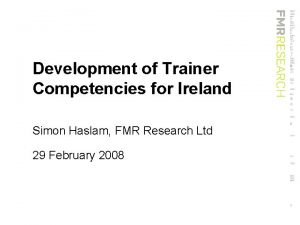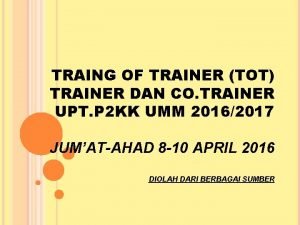Development of Trainer Competencies for Ireland Simon Haslam












- Slides: 12

Development of Trainer Competencies for Ireland Simon Haslam, FMR Research Ltd 29 February 2008

The project • Commissioned by the Trainers Network (the Trainers Network was initiated by FÁS – Ireland’s training and employment authority with EU ADAPT funding in order to develop the profession of training in Ireland) • Project objective – to conduct a survey on trainer competencies in order to establish national competency standards for trainers and identifying competencies for each of the functional areas within the training profession, that will be acceptable to FAS, to the training profession and to HETAC and FETAC (the education training awards councils).


Our process (from mid 07) • • Literature/practice review Stakeholders workshop - via Trainers Network On-line survey Results Trainers Network Expert Skills Group Draft competencies document Reflective interviews (state, business, academic voices) • Refined draft

Emergent issues • • • The terminology is challenging Initially - ‘trainers… and ‘core competencies’ Develop national/international integration… … and future-proofing Ownership by a specific body (58%) Initial level (currently) - Level 6 (Ireland) 5 (Europe) Period updating Agreed three main headings: Personal, Technical, Business… …with Knowledge, Skills, Competency dimensions “Easier conceptually than practically”

“Single most important goal” • Trainer recognition and quality assurance • Uniformity/consistency (minimum standard) • Nationally/internationally recognised acceptance (inc FAS/HETAC/FETAC) • Having a workable structure where one size doesn’t fit all

“Largest potential pitfall” • Opt-in status • Insufficient input by the profession/ provincial ownership • Losing sight of the aim of improving skills and that this is continuous • Getting bogged down in a stakeholders debate (lack of acceptance) • Need greater clarity • Trying to create a single set – compromise/generality

“Trainer” ‘A person who facilitates the development of competencies – whether one to one, group based, face to face or by remote means. ’ • Adequate term (69%)… • … though well defined (80%) • Familiar, generic (CEDEFOP) • … but narrow, old fashioned, implies ‘trainee’ • Learning Facilitator? • Compromise necessary • No presumption on job title – nor training being someone’s only role

Personal competencies • • • Listening and communication Presentation Motivational Coaching and Mentoring Facilitation skills Conflict management Personal development Ability to use a PC competently Diversity sensitivity

Technical competencies • • Understanding of learning theory Understanding of training methodologies Training support materials Trainer administration Facilitation skills Supporting learners in their environment Training evaluation and the assessment of learning • Be a subject matter expert

Business competencies • • Innovating and emerging technologies Identification of training needs Designing learning objectives Commercial acumen (budgeting) Stakeholder management Project management Personal development Training industry policy and regulation

Current 12 months aspiration • Level 6 – under three headings, with underpinning knowledge, skills, competency • Recognised by FETAC/HETAC and FAS • Project management structure (with supporting funding in place) • In step with NSAI, CEDEFOP, ISO • Clear links between competencies and government support for training interventions • Clear links between competencies and the development of trainers in Ireland
 Simon haslam
Simon haslam Cmiosh
Cmiosh Divna haslam
Divna haslam Chernobyl
Chernobyl Fspos vägledning för kontinuitetshantering
Fspos vägledning för kontinuitetshantering Typiska drag för en novell
Typiska drag för en novell Nationell inriktning för artificiell intelligens
Nationell inriktning för artificiell intelligens Vad står k.r.å.k.a.n för
Vad står k.r.å.k.a.n för Shingelfrisyren
Shingelfrisyren En lathund för arbete med kontinuitetshantering
En lathund för arbete med kontinuitetshantering Kassaregister ideell förening
Kassaregister ideell förening Personlig tidbok fylla i
Personlig tidbok fylla i Anatomi organ reproduksi
Anatomi organ reproduksi























